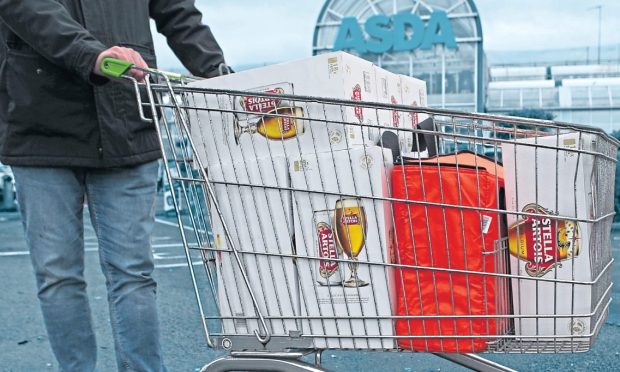
Soaring alcohol prices in Scotland are driving shoppers online and over the border into England in search of bargains.
The Scottish Government’s decision to hike the minimum unit price from 50p to 65p has created a disparity between prices in Scotland and England, with a bottle of gin more than £7 more north of the border and some beer and cider nearly double the price down south.
Small Scottish retailers say they are losing out as shoppers head south on “booze cruises” to the big English supermarkets in Berwick-upon-Tweed and Carlisle and to online platforms like Amazon.
They also report a surge in shoplifting by people unable to afford the inflated prices.
The difference in prices is compounded by the availability of multi-buy offers in England that were banned in Scotland in 2011 as part of the Scottish Government’s strategy to cut alcohol consumption.
Minimum unit price impact
Retailers say the new minimum unit price (MUP), introduced at the end of September, has already had a dramatic effect on the behaviour of shoppers and the arrival of the festive season has exacerbated the situation.
With the minimum price affecting the lower end of the market most, pushing previously cheap options up close to premium products, there are also concerns over counterfeit alcohol.
Hassan Lal, district president of the Federation of Independent Retailers, said small Scottish shops were losing out to English supermarkets and online retailers who charge English prices despite delivering to Scotland.
“We’ve been left with a very un-level playing field,” he said. “People are still drinking the same but they are finding alternative ways of buying it.”
“It is the small independent Scottish retailers who are being hit and the English supermarkets are making the money.”
He said the “massive” price increases meant that most shoplifting was now alcohol-related and many of his regular customers were switching to buying on Amazon or crossing the border to shop.
“They’re charged at the English price and customers are saying why should we buy from you when we can get it online and delivered the next day?”
“People are going across the border and bringing stuff back for friends. You can’t stop people doing it – you can’t police it and it is a massive saving.”
He said retailers were all in favour of saving lives but the best way to tackle the problem would be to invest in addiction treatment. He also urged the Scottish Government to meet with Amazon to discuss applying MUP to alcohol delivered to Scotland.
Scotland’s loss is England’s gain
Ewan MacDonald-Russell, deputy head of the Scottish Retail Consortium, said Scotland’s loss was England’s gain.
“The price difference between alcoholic products in Scotland and England is now quite significant, and many Scottish shoppers are likely to respond by shopping across the border. That may even increase in the next few weeks as retailers tend to offer their best deals at Christmas.
“With many of our customers continuing to feel the pinch, it’s hardly surprising they will look to find the best deals. As for retailers, ultimately this means stores on the English side of the border are better able to attract shoppers, which puts even more pressure on Scottish shops.”
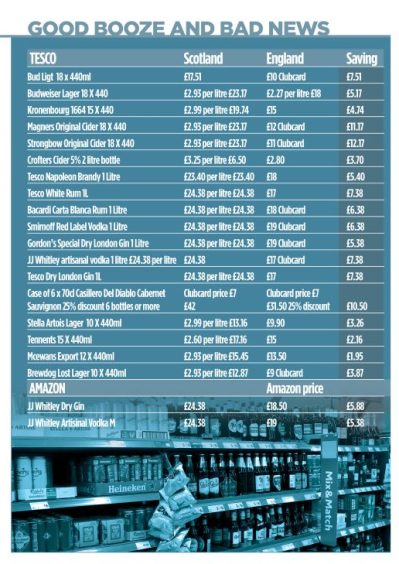
Under the new rules, shops in Scotland have to charge a minimum of 65p per unit of alcohol – up 30% on the previous 50p per unit – but, as the surcharge is not a tax, the retailers keep the money.
Earlier this year the Scottish Government estimated retailers would see revenue increase £16.5 million per year after the uplift – and £45.8m more than without any MUP.
It calculated that big supermarkets would recoup the drop in sales from increased prices but forecast that smaller convenience stores would lose out, suffering a decline in revenue.
Campaigners working in the field of addiction say the government policy is not working.
Annemarie Ward pointed to an increase in alcohol-related deaths by 9.6% since the introduction of MUP as evidence the policy is failing. The Scottish Government maintains the increase would have been higher without price controls.
“When MUP was introduced in 2018, it was promoted as a world-leading intervention to tackle alcohol-related harm. However, evidence since paints a starkly different picture,” she said.
She said research also suggested the policy was having a disproportionate impact on Scotland’s most vulnerable populations.
“Public Health Scotland acknowledges that individuals experiencing alcohol dependence are substituting essential needs, like food, to afford alcohol at increased prices,” she said.
She said the black market for counterfeit alcohol also posed a growing risk, with MUP pushing individuals toward dangerous alternatives.
And she suggested supermarkets who were gaining financially should donate excess profits to help pay to fund addiction recovery services, support education campaigns and subsidise healthier choices. If they did not, she said, then the government should impose a levy.
“This isn’t just about pointing fingers at big corporations,” she said. “It’s about making sure policies like MUP, which are supposed to reduce harm, don’t leave the vulnerable worse off while the wealthy get richer. It’s about fairness, transparency, and doing what’s right for the people and communities affected by alcohol harm.”
Shadow cabinet secretary for business Murdo Fraser accused the SNP Government of boosting profits for English retailers at the expense of Scottish firms.
“Any gap in taxes, rates relief or prices fixed by government risks changing behaviour and putting Scottish firms at a disadvantage,” he said.
“The SNP’s left-wing policies on all those have hammered businesses, hit hard-pressed households and held back growth. Unless they reverse them and adopt a common-sense approach, Scottish firms and their customers will continue to pay the price.”
Last year the Scottish Government backtracked on claims the MUP policy had directly saved lives.
National Records of Scotland showed there were 1,277 alcohol-related deaths in 2023, the highest figure since 2008.
Borders raiders: The Scots who head south to save ££££ on booze
On a cold Saturday morning in Carlisle, a steady trickle of Scots have journeyed across the border searching for a bargain.
At the town’s Asda superstore, located just 10 minutes over the Scotland-England border, trolleys are piled high with a selection of alcohol – from prosecco to packs of beer.
It was fairly obvious as to who among the shoppers was Scottish – the ones whose trolleys were filled only with alcohol, rather than groceries. Some even took multiple trips into the store to get everything they wanted.
Colin Hastie drove from Larkhall to stock up and bought 12 cases of Bud Light for himself and family members, along with some gin.
A case of Bud Light costs £8, and was also the subject of a multibuy offer of three for £23 – an offer now banned in Scotland. His total spend on beer was £92, whereas in Scotland it would have been £120.
He also bought a bottle of gin which was down from £26 to £20. Thanks to minimum pricing, the average bottle of gin in Scotland costs around £24.
Colin said he and his friends take turns to go and stock up, something they have been doing for around six months.
He explained: “It was my brother’s idea. He was working down here and he had said it was cheaper.
“He had his van, so he brought up about 30 cases between three of us. So we got 10 each, but I can’t get that many in my car. It should be cheaper at home; we’re getting ripped off. They’re trying to make out we’re alcoholics and going to hospital with drink problems, but nobody bothers in Carlisle.”
Another shopper, Alan, said it was worth coming to Carlisle, despite the high cost of petrol. He bought 11 cases of Stella Artois, each containing 18 bottles, and planned to go in for more. The cases cost up to £16 in Scotland, but in England it’s £13 a case, meaning he saved £33.
He said: “This is the first trip we’ve done this year and I’d do it again.
“Once they start putting prices up they just keep doing it and doing it.
“I understand what they’re trying to do in regard to problem drinkers but it affects everybody.”
Both men said that, on top of the overall cost of the alcohol being lower, there were good offers to be had, which would not be possible in Scotland.
Nearby at the Morrisons supermarket, another man from Scotland, who wished to remain anonymous, had a trolley full of different types of alcohol. He said he crosses the border every year to pick up cheap booze.
He bought six cases of Stella Artois, six Carling, three Carlsberg and a bottle of Baileys.
Stella Artois in Scotland costs £16, but £13 in Carlisle. Carling retails at around £16 in Scotland, but £12 in England and Carlsberg is £10, compared to Scotland’s £12. Baileys, which usually costs £13 in Scotland, only cost £8.50 due to a deal in the shop, giving him a total saving of £52.50.
He said: “It’s worth the petrol, it works out at a tenner each if there are two of us and this isn’t the only shop we go to.
“I don’t know if Baileys is cheaper here but someone asked me to get it and under the deal we enjoyed, if you spend £45 then you get it for £8.50. I’m assuming that’s a big saving.”
Minister says minimum unit pricing policy has saved hundreds of Scots’ lives
Health Secretary Neil Gray claimed research carried out by Scottish Government-funded Public Health Scotland (PHS) before the recent increase in MUP (minimum unit price) supported the policy.
He said: “Research commended by internationally-renowned public health experts estimated that our world-leading policy has saved hundreds of lives, likely averted hundreds of alcohol-attributable hospital admissions and contributed to tackling health inequalities.
“The PHS evaluation found some evidence of cross-border purchasing, but its extent was observed to be minimal. The Scottish Government does not anticipate significant changes to cross-border sales following the increase of the MUP but will keep this under review.”
In fact, alcohol-related deaths have risen by 12% since MUP was introduced. According to the National Records of Scotland there were 1,277 alcohol-related deaths in 2023, the highest figure since 2008. In 2018, when MUP was introduced, there were 1,136 deaths.
The 2023 PHS report into the effects of MUP suggested that MUP was associated with a 13% reduction in deaths wholly attributable to alcohol consumption. It found that a smaller decrease in hospital admissions was non-significant.
But the report also found that there was an increase in deaths from acute causes, possibly as a result of people spending money on drink rather than food or switching to stronger drinks. Hospital admissions also went up for acute cases.
The PHS report has been criticised for disregarding contradictory evidence and last year the Scottish Government appeared to backtrack on Gray’s claims that the MUP policy had directly saved lives.
A statement claiming the policy was “saving lives, reducing alcohol harms and hospital admissions” was subsequently watered down and another claim deleted altogether. The original statement had claimed: “Wide-ranging evidence drawing on 40 independent research publications, showed that MUP has been effective in its main goal of reducing alcohol harm with the reduction in deaths and hospital admissions specific to the timing of MUP implementation.”
Previous studies have also questioned the Scottish Government’s alcohol policies.
In 2011 a Cambridge University study published in the leading academic journal Addiction found that the ban on multi-buy promotions had failed to reduce the amount of alcohol purchased.

Enjoy the convenience of having The Sunday Post delivered as a digital ePaper straight to your smartphone, tablet or computer.
Subscribe for only £5.49 a month and enjoy all the benefits of the printed paper as a digital replica.
Subscribe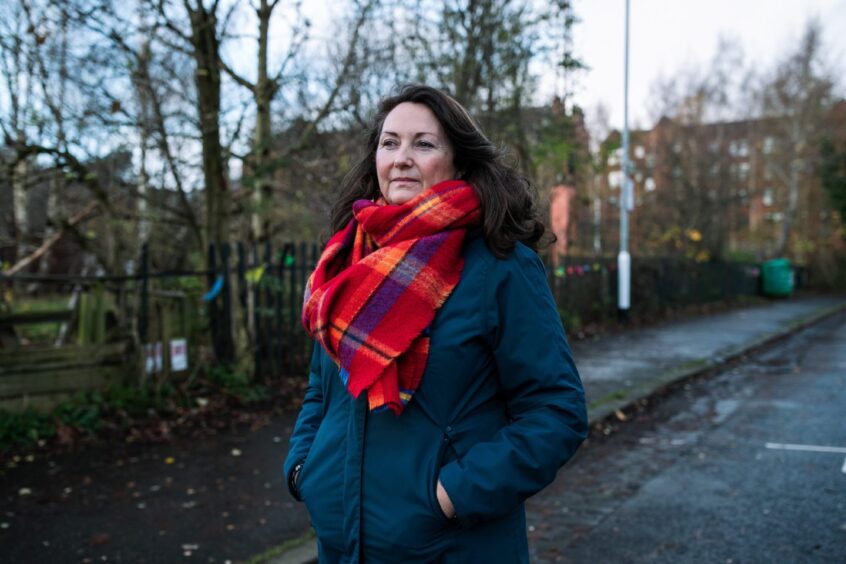 © Andrew Cawley
© Andrew Cawley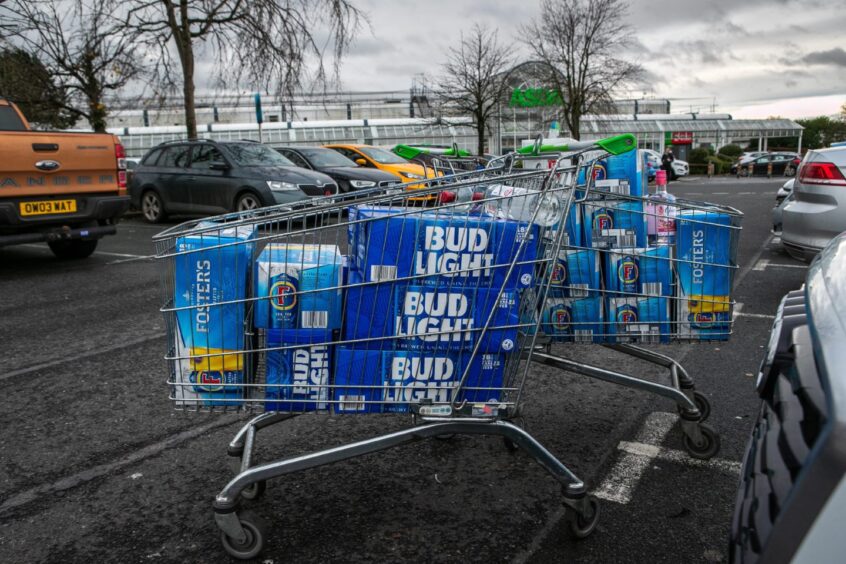 © Andrew Cawley
© Andrew Cawley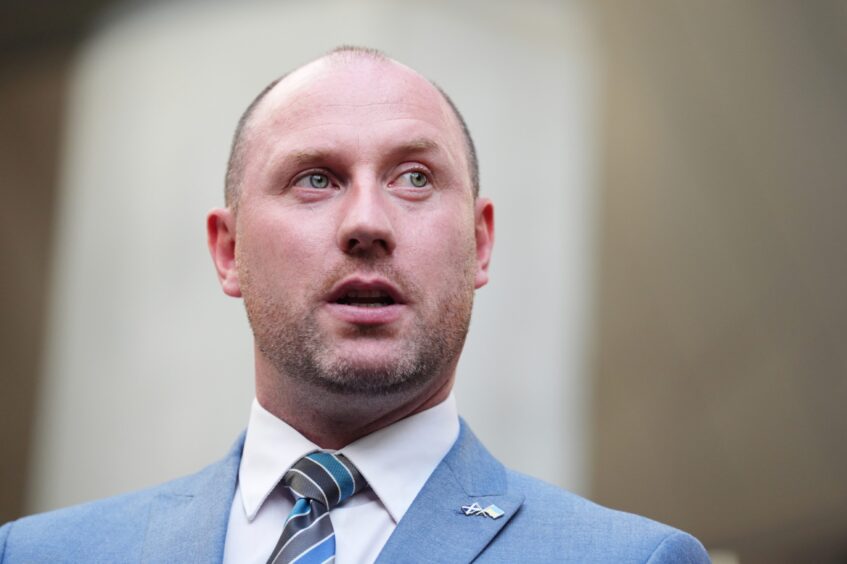 © Andrew Milligan/PA Wire
© Andrew Milligan/PA Wire